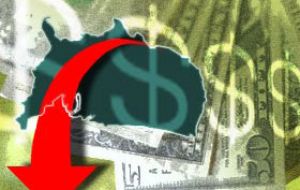MercoPress. South Atlantic News Agency
Argentina reacts angrily to S&P debt rating downgrade

Argentina Economy Ministry sources reacted angrily to a debt ratings downgrade by Standard & Poor's on Friday saying it was “another mistaken decision”. S&P downgraded Argentina's foreign-currency rating to “B-” from “B”.
Argentina's economy has robust fundamentals after years of strong economic growth and fiscal surpluses, insisted the source. "Argentina's financial position continues and will remain solid and capable of complying with all obligations with its creditors during 2009, independent of market conditions" added the source. S&P cited concerns about the deteriorating economic and political environment and fiscal pressures as Argentina's debt obligations for next year rise to more than 20 billion US dollars at a time when it is shut out of international credit markets. "The 2009 financial program sets out financing needs that can be entirely covered with public intra-sector financing," the source said. Argentina is not facing any financing issues and has a solid budget plan for 2009 based on estimates of 4% growth in gross domestic product and a primary budget surplus of 3.27% of GDP, the source said. The source said that Standard & Poor's credibility was "fatally wounded" by its failure to predict the sub-prime lending crisis in the United States. "On what authority can they suggest that Argentina is doing poorly or badly when they gave their highest ratings to assets that later turned out to be toxic and set off a global financial crisis?" the source said. Argentina's GDP has expanded at an average of more than 8% a year in recent years and investment has increased at a rate of 25.4%, the source said. The financial system is solid and liquid, and the trade balance has been higher than $10 billion a year in recent years and become more diversified in terms of countries that Argentina sends exports to, the source said. Government income has grown at an annual average of 32% over the last six years, while spending has grown at 29%, the source said. Much of Argentina's debt is in local currency, and debt payments currently represent less than 10 percent of government income, the source said. However Rodolfo Rossi a former president of the Argentine central bank said that the S&P down rating was predictable, following the IMF position. On the local foreign exchange market, the central bank made hefty dollar sales on Friday in order to prop up the Argentine Peso, which has been pressured in recent weeks due to safe-haven dollar-buying by savers and local companies. "The central bank offered to sell about 400 million USD at 3.379 Pesos per dollar when demand was pressuring the peso" according to one currency trader. The Peso has fallen 7.8% in October in the inter-bank sector despite the repeated intervention of the central bank. In Buenos Aires city foreign exchange houses the Peso was trading up 0.29% at 3.4600/3.4650 per dollar. Currency traders and analysts said that the Argentine government will let the Peso slide "gently" to 3.5/3.6 to the US dollar in line with the Brazilian Real (Argentina's main trade partner) and responding to local industry requests to prop international competitiveness. Local Argentine bonds have fallen by an average 64% since the start of the month, and traders said Friday's decision by the ratings agency further dampened investor sentiment.




Top Comments
Disclaimer & comment rulesCommenting for this story is now closed.
If you have a Facebook account, become a fan and comment on our Facebook Page!